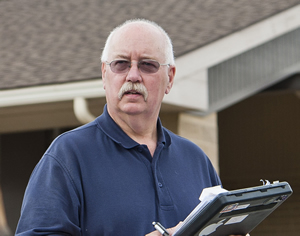Ready to Run: The Healing Hands of an Equine Surgeon
He is the last person anyone wants to see on TV in the moments after the Kentucky Derby, but any other time the presence of Dr. Larry Bramlage is a welcome event. As the on-call veterinarian for the American Association of Equine Practitioners and the designated on-air personality for broadcasts, Bramlage is the face of racing injuries.

Dr. Larry Bramlage (Eclipse Sportswire)
Bramlage had to make the sad announcement when the filly Eight Belles broke down after a runner-up finish in the 2008 Kentucky Derby, and it might be hard to understand why anyone would accept such a thankless and challenging post.
“Someone has to deliver the news to the public in a way they can digest and understand,” said Bramlage, a veterinary surgeon at the Rood & Riddle Equine Hospital in Lexington and chairman of the Grayson-Jockey Club Research Foundation’s veterinary advisory committee. “Otherwise they walk away with questions and they might abhor the sport.”
Bramlage, 60, is no TV talking head. He might not only make the statement about a horse’s condition to the public, but he might wind up performing the necessary surgery to save its life.
What the public who sees him a handful of times throughout the racing year doesn’t know is that Bramlage renowned around the world. Owners and trainers ship horses to him from all over to take advantage of his expertise. On a recent day on Derby Week, when 10 surgeries were scheduled, equine patients came from as far away as New York and Ontario.
Bramlage’s skills are in high demand and even higher during the spring. His schedule is packed with farm visits, numerous exams on horses that run poorly for no apparent reason, surgeries, teaching duties at Ohio State and untold email requests for consultations.
“I don’t get to see my office this time of year,” he said, “My office is wherever there is a computer.”
On Tuesdays when faced with lameness exams, Bramlage’s orbit is well defined — outside for exams, inside for ultrasounds and X-rays, radiology to view results, consultations with trainers.
Repeat a dozen more times.
As the son of a cattleman from Kansas, Bramlage’s journey to Rood & Riddle was marked by a few decisive moments in his youth.
When challenged by a high school guidance counselor to come up with a plan for his life, Bramlage considered his options. According to Bramlage, “We didn’t have a lot of money and the counselor knew that.” After thinking about his exposure to veterinarians growing up near his father’s cattle operation, Bramlage returned to the counselor and declared, “I know what I want to do; I want to be a vet.”
Bramlage credits the counselor with not only giving him the right impetus to focus on his future but also assisting with much of the paperwork involved in securing scholarships and grants to afford attending college.
He left Marysville, Kansas and headed down the road to Manhattan to attend Kansas State. In 1971, Bramlage graduated from the undergraduate program and completed classes at the Kansas State College of Veterinary Medicine in 1975.
Bramlage worked his way through school never considering what his career might be like on the other end.
“I just figured I would graduate and go back to a small town, drive around a truck from farm to farm and be a small-town vet,” he said.
Then Bramlage happened to see horses training at Fonner Park in Grand Island, Nebraska. “As soon as I saw them, I knew that was what I wanted to do. I didn’t know when, or if I would get to, but that was what I wanted,” said Bramlage. “I was in love with thoroughbred race horses before I ever saw them race.”
Now, more than 30 years later, Bramlage considers himself lucky to be working primarily with thoroughbreds. “Everybody has in their mind what they think the perfect horse looks like; for me it is the thoroughbred race horse,” he said.
“A lot of it has to do with how athletic they are and how good they are at their job,” he said, “They are awesome. Their entire system supports one thing, and that is that they can run.”
It is because of this understanding that Bramlage feels a certain stewardship over the game of racing. His involvement with the AAEP On-Call program is voluntary and unpaid. “My job is not only to treat horses, but to help people understand.”
While Bramlage believes some of the disconnect between racing and the public is the fault of racing management, he also said a great deal is connected to the urbanization of society.
“Racing in general did a poor job of stimulating interest to two or three generations when the whole population became more urban and a little more detached from the horse,” he said, “It is no secret racing turned down television when television was young and pro football said ‘We’ll do it’ and look at what happened to pro football.”
It is in this detachment from horses where Bramlage finds the most misconceptions and, consequently, the greatest opportunity to educate the public. “People tend to think of horses in relation to their own feelings,” he said, “They don’t understand the medical procedures compared to their own.”
Bramlage uses the comparison of methods of taking medicine as a simple example. “People prefer to take it (medicine) orally and are stressed by needles, needles to a horse are not a big deal.”
When asked about the movement to eliminate medications in race horses, he said, “We have more medications (for treatement) than we have ever had in the past, but its use on race day is the least it has ever been.
“I think we probably will have to get totally medication-free in order for people to be comfortable with racing,” he said, “I hate to say that because it is going to be harder on the horses, but I think we will have to do that. There are bad apples in every barrel, but the stance of most horsemen is to do what is best for the horse.”
On a recent visit to Churchill Downs, a passing trainer called out to Bramlage, “I sure am glad I listened to you, my horse is doing great.” Trying to be humble, Bramlage responded, “I get it right sometimes.” The trainer responded back, “No, you are right all the time.”
He believes it is his job to keep his patients as sound as possible so they can race, because, that is what horses love to do.
“We have to make people comfortable with the fact these horses love to race,” he said, “When you drive around Central Kentucky this time of year, likely as not you’ll see the yearlings racing in the fields to see who is toughest.
“You don’t force a thoroughbred to race; it is in their blood. We just want to be sure people understand that.”
 Scott Serio is the founder of
Scott Serio is the founder of 

2 Comments